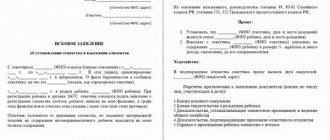The concept and significance of the trial stage
The trial is intended to consider and resolve a civil case on its merits and occupies a central place among other stages of the civil process, since it is at this stage that the goals and objectives common to civil proceedings are carried out.
The importance of the trial stage
- The trial is the main stage of the process. It is at this stage of the trial:
- the principles of justice (adversarial, dispositive, direct, etc.) operate most fully;
- the main task of justice is solved - the correct and timely consideration and resolution of the case (other stages only ensure the solution of this problem);
- The vast majority of civil cases are considered and resolved.
- Based on the results of the court’s activities at this stage, the population assesses the state of legality in justice (due to the principle of transparency).
The stage of the process under consideration differs from others not only in its specific goals, but also in its subject composition, object and content. The main participant in the process is the court of first instance (magistrate). Its activities are aimed at considering and resolving disputes about the law between the parties to the case.
At this stage, such participants in the process appear who, as a rule, are not present at other stages - witnesses, experts, specialists.
When considering a case, the court of first instance must:
- clearly understand the essence of the plaintiff’s demands and the defendant’s objections;
- directly examine the evidence;
- establish the factual circumstances of the case;
- find out the rights and obligations of the parties, the interests of applicants protected by law.
The trial stage ends, as a rule, with a decision being made on behalf of the Russian Federation. When resolving a case, the court is obliged to make a lawful and justified judicial decision that protects the rights and legally protected interests of citizens and legal entities.
Components of judicial proceedings in civil proceedings (concept and meaning)
The trial is the central stage of civil proceedings, in which the case is considered and resolved on its merits. As a rule, the court hearing ends with a decision.
The law establishes the procedure for conducting a trial, which usually takes place at a court hearing . A court hearing is a procedural form of judicial proceedings and is related to it as a part and a whole.
Civil cases are considered and resolved by the court before the expiration of two months from the date of receipt of the application to the court, and by a magistrate - before the expiration of a month from the date of acceptance of the application for proceedings. Cases regarding reinstatement at work and collection of alimony are considered and resolved before the end of the month.
The court hearing can be divided into four parts:
1) preparatory;
2) consideration of the case on the merits;
3) judicial debates;
4) making and announcing the decision.
The preparatory part represents the actions of the court aimed at clarifying the possibility of considering the case on the merits. If there are grounds specified in Art. 169 of the Code of Civil Procedure of the Russian Federation, the court postpones the hearing of the case.
The court session begins with the announcement of the presiding officer about what case is to be considered. After this, the secretary of the court session reports to the court which of the persons summoned in the civil case did not appear and the reason for their failure to appear. The consequences of failure to appear at a court hearing by persons participating in the case and their representatives are determined by Art. 167 Code of Civil Procedure of the Russian Federation. The question of the possibility of considering a case in case of failure to appear at the meeting of persons promoting justice is decided according to the rules of Art. 168 Code of Civil Procedure of the Russian Federation.
After checking the attendance of the participants in the process, the judge must find out all the issues related to the participation of an interpreter in the case (offer the candidacy of an interpreter to the person who needs translation). The translator is warned by the presiding officer about criminal liability for knowingly incorrect translation and attaches his signature to this effect to the minutes of the court session.
Witnesses are then removed from the courtroom and subsequently summoned separately for questioning. If the trial is postponed, the court has the right to question the witnesses who have appeared, if the parties are present in the courtroom.
The presiding judge announces the composition of the court and all participants in the process, clarifies the issue of declared challenges and self-recusations. The presiding officer explains to the persons participating in the case their procedural rights and obligations. Next, the submitted petitions are resolved and, taking into account the opinions of the persons participating in the case, appropriate determinations are made. At the end of the preparatory part, the presiding officer, if a specialist or expert is involved in the case, explains their rights and obligations and warns the expert about criminal liability for giving a knowingly false conclusion.
The consideration of the case on its merits begins with a report by the presiding judge or one of the judges. The report sets out the essence of the defendant's claims and objections and the evidence available in the case.
Before starting the consideration of the case materials, the presiding officer asks the parties whether they wish to exercise their right to administrative actions provided for in Art. 39 Code of Civil Procedure of the Russian Federation. If the plaintiff refuses the claim, or the defendant admits the claim, or the parties enter into a settlement agreement, then the judge must be guided by Art. 173 Code of Civil Procedure of the Russian Federation.
Consideration of the case on its merits begins with an explanation of the persons involved in the case. The order of their speeches is clearly defined by Art. 174 Code of Civil Procedure of the Russian Federation. The court, as well as persons participating in the case, may ask questions or demand some clarification.
Having heard the explanations of the persons participating in the case, the court, taking into account their opinions, establishes the sequence of examination of the evidence.
The interrogation of witnesses is carried out according to the rules of Art. Art. 176-180 Code of Civil Procedure of the Russian Federation. Written evidence is examined according to the rules of Art. 181 Code of Civil Procedure of the Russian Federation. Personal information contained in citizens' correspondence and telegraph messages is considered in an open meeting only with the consent of the persons between whom the correspondence was conducted. Physical evidence is examined according to the rules of Art. 183 Code of Civil Procedure of the Russian Federation. Written and material evidence that cannot be examined in the courtroom is examined by the court on the spot, and a protocol is drawn up and attached to the case.
The study of audio and video recordings is carried out in accordance with Art. 185 of the Code of Civil Procedure of the Russian Federation, taking into account the requirements for the privacy of a citizen’s personal life, provided for in Art. 182 Code of Civil Procedure of the Russian Federation.
In case of an allegation that a particular piece of evidence is falsified, the court may order an examination in accordance with Art. 186 Code of Civil Procedure of the Russian Federation. After examining all the evidence, the presiding judge asks the persons participating in the case about their desire to make additional explanations and, in the absence of such statements, proceeds to the judicial debate.
Judicial debate is an independent part of the trial, in which the persons participating in the case, in their speeches, summarize the results of the process, focus on the strengths of their positions and point out the weaknesses in the position of the opposing party. The order of speeches in the debate is established by Art. 190 Code of Civil Procedure of the Russian Federation. A person may refuse to speak in the debate or entrust his representative with the right to express a common position. The time for speaking in the debate is not limited by law, but the presiding officer can reprimand the speaker if he deviates from the subject of the case under consideration.
Each person speaking in the debate has the right to make a comment in connection with what has been said. The right of the last remark always belongs to the defendant, his representative. Refusal to speak in a debate does not deprive a person of the right to make a comment.
The law prohibits reference in speeches after consideration of the case on the merits to circumstances that were not clarified by the court, as well as to evidence that the court did not examine at the trial. If, after the judicial debate, the court finds it necessary to clarify new circumstances or examine new evidence, it issues a ruling to reopen the case on the merits.
Upon completion of this part of the court session, the court retires to the deliberation room to make (make) a decision , which the presiding officer announces to those present in the courtroom (Article 192 of the Code of Civil Procedure of the Russian Federation).
The court decision is made in a special court room - a deliberation room, where access is prohibited to anyone except the judge who is part of the court in the given case. When making a decision, the court is guided by Art. 196 Code of Civil Procedure of the Russian Federation.
The court's decision is stated in writing by the presiding judge or one of the judges. The court decision is signed by the judge when he is considering the case alone or by all judges when the case is being considered collectively, including the judge who has a dissenting opinion. Corrections made to the court decision must be certified by the signatures of the judges.
After the decision is made and signed, the court returns to the courtroom, where the presiding judge or one of the judges announces the court's decision . Then the presiding officer orally explains the content of the court decision, the procedure and deadline for appealing it.
The court's decision is made immediately after the hearing of the case. The preparation of a reasoned court decision may be postponed for a period of no more than five days from the date of completion of the trial of the case, but the operative part of the decision must be announced by the court at the same court session in which the trial of the case ended. The announced operative part of the court decision must be signed by all judges and attached to the case.
When announcing only the operative part of a court decision, the presiding judge is obliged to explain when the persons participating in the case and their representatives can familiarize themselves with the reasoned court decision.
Commentary on Article 157 of the Code of Civil Procedure of the Russian Federation
1. The immediacy of the trial lies in the court’s personal perception of the evidentiary material in the case. The court bases its decision only on the evidence that was examined at the court hearing (Article 195 of the Code of Civil Procedure of the Russian Federation). The law also establishes methods for direct examination of evidence: hearing explanations of the parties and third parties (Part 1 of Article 174 of the Code of Civil Procedure of the Russian Federation), testimony of witnesses (Part 1 of Article 177 of the Code of Civil Procedure of the Russian Federation), expert opinions (Part 1 of Article 187 of the Code of Civil Procedure of the Russian Federation) , consultations and explanations from specialists (Part 2 of Article 188 of the Code of Civil Procedure of the Russian Federation), familiarization with written evidence (Article 181 of the Code of Civil Procedure of the Russian Federation), inspection of physical evidence (Part 1 of Article 183 of the Code of Civil Procedure of the Russian Federation), listening to audio recordings, viewing video recordings (Art. 185 Code of Civil Procedure of the Russian Federation).
The immediacy of the trial requires that the court interrogate eyewitnesses, and not persons who know about the circumstances of the case from the words of the latter, examine and examine genuine material evidence, examine original documents, and not their copies, etc. In some cases, when the initial means of proof are unavailable, suffer from incompleteness, or contain contradictions, the court may deviate from the principle of immediacy and use derivative means of proof along with the original ones or instead of them, which is expressly provided by law, for example, a copy of written evidence may be the subject of examination in court, but it must be properly certified (part 2 of article 71 of the Code of Civil Procedure of the Russian Federation). As an exception to the requirement of immediacy, the provisions of Art. 58, 62, 64, 75, 170 Code of Civil Procedure of the Russian Federation and a number of others.
The immediacy of judicial proceedings also includes the requirement for a constant composition of judges. To correctly assess the evidence available in a case and make a lawful and informed decision, judges must be aware of the circumstances of the case under consideration. Therefore, it is necessary that the composition of the court that began to consider the case remains unchanged until the end of the trial and the issuance of a court decision. If one of the judges is replaced during the consideration of a case, the proceedings must be carried out from the very beginning.
2. Judicial proceedings take place in the form of a court agreement. The oral form of communication between the court and other participants in the process ensures the immediacy of the trial, along with which it is the most important guarantee of a well-founded court decision. The principle of oral proceedings is manifested in Art. 172, 174, 177, 187, 189, 190, 193 Code of Civil Procedure of the Russian Federation, etc. Orality can be considered as a manifestation of the publicity of the trial (Article 10 of the Code of Civil Procedure of the Russian Federation).
3. The requirement for continuity of trial is aimed at ensuring a holistic perception by the same court panel or judge of the evidentiary material examined in the case. Without completing the trial of the case, the court has no right to consider other civil, criminal or administrative cases. Meanwhile, as practice shows, one judge, as a rule, has several cases pending. A similar situation arises if the trial of the case is postponed (Article 169 of the Code of Civil Procedure of the Russian Federation). In order to ensure that the immediacy of the evidence perceived by the court is not weakened by the impressions received during the hearing of a new case, the rule of Part 3 of Art. 169 of the Code of Civil Procedure of the Russian Federation, which provides for the trial of the case after its adjournment to begin again.
Article 157 of the Code of Civil Procedure of the Russian Federation establishes an exception to the rule of continuity of judicial proceedings - the announcement of a break intended for rest. The length of the court break is determined by the court at its discretion.
The principle of continuity applies to the entire legal proceedings, including the making and announcement of the decision. The court decision is made immediately after the hearing of the case, but the preparation of a reasoned court decision may be postponed (Article 199 of the Code of Civil Procedure of the Russian Federation). A guarantee of continuity of judicial proceedings is the duty of the court to announce the operative part of the court decision at the same court session.









